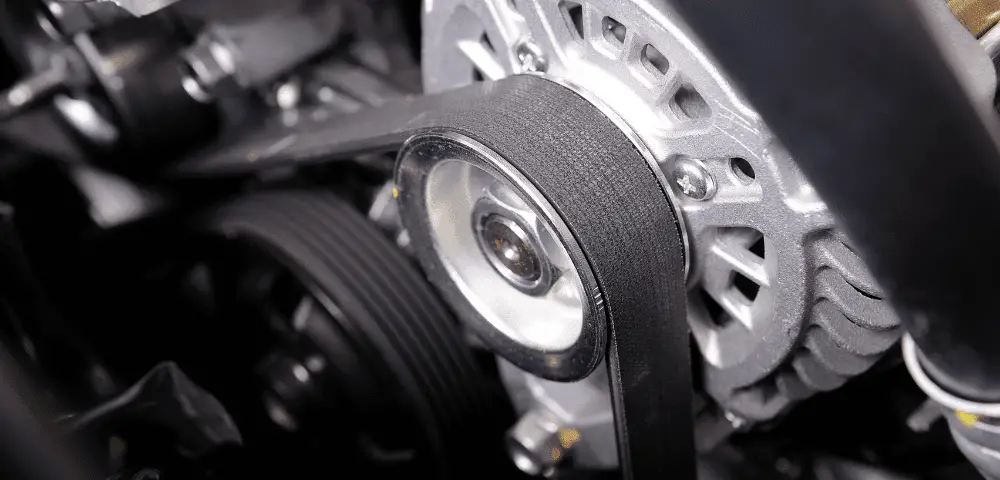There is nothing more unappealing than a wailing car on the road that squeals whenever you start or accelerate it.
It’s very easy to fix and there are numerous things you can do to avoid that.
The primary reason behind the squealing noise is improper tension in the serpentine belt, which slips from the pulley grooves and creates noise.
There are many things you can do to avoid that noise and it all starts with knowing the main causes of squealing belts.
Most Common Serpentine Belt Noises?
Generally, a serpentine belt will make a chirping or squealing noise.
The intensity of belt noise can increase or decrease with the speed of the engine, and that indicates an issue in the belt system of the car.
Sometimes you’ll also think that your belt is making a distinctive howling sound, but that usually originates from other sources in the engine.
Are Serpentine Belts the Only Cause of Belt Noises in the Car?
No, serpentine belts are not the only belts in a car.
Multiple other belts like the timing belt or fan belts (in older models) operate with the same principle and can create noise if they are worn out or damaged.
Apart from that, there are numerous pulley systems, shocks, and other transmission components that generally make a similar noise and should be investigated if the belts are in pristine condition.
Common Causes Behind a Squealing Serpentine Belt
Serpentine belts squeal because of a variety of reasons and almost all of them can potentially lead to failure if not addressed properly.
The most squealing belt noise from serpentine belts generally comes down to the following sources:
1. Improper Installation
One of the primary reasons behind a squealing serpentine belt can be improper installation.
The right installation ensures that the serpentine belt powers and remains in perfect condition for the longest time and performs at its best.
However, proper installation requires utmost precision with regard to the tension in the belt.
You have to start by properly tensioning the belt first and redo everything after running the engine for a while.
Failing to do that would cause issues with the belt and ultimately lead to replacement if ignored.
2. Leaks and Flaws
Another common problem behind the squeaking sound is a frictional disturbance in the belt. Fluids like water, oil, or grease leak onto the tensioner and to the belt from there.
This ultimately causes the belt to slip from the tensioner arm pully groove and may result in squealing.
One of the classic signs of a wet belt is a squealing sound in only the beginning. A wet belt starts squealing in the beginning and ends up getting quiet as it dries out.
3. Misalignment
Vehicles need to be precise and compact at the same time.
Any misalignment in the pulleys and belt system will create unwanted noise, which is an indicator of the fact that something is wrong belt drive system.
Furthermore, misalignment will also cause several issues in the car down the line.
Belts worn belt, are only designed to sustain load from one side or angle and any deviation from that due to misalignment will cause the belt to deteriorate faster and affect your car’s performance.
4. Contamination
Fluid leakage is not the only factor that affects the performance of your belts.
In many cases, dust, debris, and other environmental contaminants can have the same effect and cause your belt to slip.
Generally, a belt dressing can help keep the contamination to a minimum and ensure optimal performance at low belt tension anyway.
It can also help maintain the belt and improve its longevity, which means that you won’t have to worry about it breaking down for a long time.
5. Basic Wear and Tear
Finally, all belts get subjected to basic wear and tear with use.
The rubber components degrade with time and may need to be replaced periodically.
Fortunately, it’s possible to tell when the belt has completed its lifespan by simply looking at it.
Major signs are cracking, glazing, and brittleness in the rubber belt itself, which tells you that it’s time for a replacement.
Is it Safe to Drive with a Squealing Serpentine Belt?
The short answer is no!
Serpentine belts power many critical components, especially in modern vehicles, and their failure can cause your car to break down.
From auxiliary systems like the air conditioner to integral components like the power steering or the alternator, serpentine belts run it all!
However, it’s also important to note that serpentine belts will not cause significant damage to your engine belt or vehicle if they break down. They are not like the timing belt.
In some cases, the vehicle might be able to run for a while even if the serpentine belt is broken.
But that case is only for older vehicles or models where the serpentine belts don’t control the cooling system in the vehicle.
My Serpentine Belt is Already Squealing. Will a Belt Dressing Help?
Belt dressings are a temporary solution that falls under the domain of preventive maintenance.
In most cases, they won’t be of help if the damage is already done. However, it can be a great help if the squeaking is because of contaminants or fluids.
One of the best ways to get the most out of belt dressing is to use a two-prong approach.
Soak the dry belt from both sides with the dressing and wait for it to moisturize the entire belt. Soak it again once it sets and start the vehicle.
The serpentine belt in this case will shriek louder than before.
However, you need to ignore it and start driving. Increase the speed and the squeaking will gradually go away.
What to Do If My Serpentine Belt is Squealing?
Now that you know why the serpentine belt squeals, it’s time to know the belt squeal and what to do when it does.
Fixing a squeaky belt needs a 3-step system that ensures correct diagnosis and allows you to get the best results with minimal effort.
Here’s what you should do!
1. Identify the Cause
The first step is to understand the main cause of the noise.
It is highly improbable that the source of the noise is the timing belt. Those belts don’t slip because they have teeth that prevent slippage. So, you should look at other sources.
In most cases, the main cause is the serpentine belt.
However, you should also check other auxiliary belts like the fan belt, alternator belt, etc.
Modern cars will not have a fan belt, which means that the likely source is the serpentine belt.
2. Address the Issue
Now that you know the source of the noise, it’s time to address the issue.
The noise can come from contamination and fluid leakage, and the best way to deal with it is to dress the belt. This is a temporary solution at best.
However, it can work for a long time and reduce the amount of contamination in the belt system.
3. Replace the Belt
The final solution (the only solution) is to replace the belt.
It’s always recommended to replace the belts at the manufacturer’s prescribed times irrespective of their condition.
However, rough driving or harsh conditions can cause the belt to deteriorate faster.
You should always get your belts checked by a certified mechanic who can tell you what would be the next step according to the condition of your car.
But if you want to check yourself, look for signs of cracks and brittleness in the belt.
Lastly, if you think your belts need to be replaced, it’s probably best to replace them as soon as possible.
Automobile belts are not too expensive or complicated but can cause significant damage to your vehicle if they are left to their devices in the long run.
Key Takeaways
Strange noise coming out of your otherwise perfect car would obviously be concerning for you.
However, you shouldn’t panic whenever you face this situation. It’s probably your car’s serpentine belt and that can be easily replaced.
If you don’t know what to look for or how to go about changing it, it’s best to visit your mechanic and get it done to ensure the peak performance and reliability of your vehicle.


